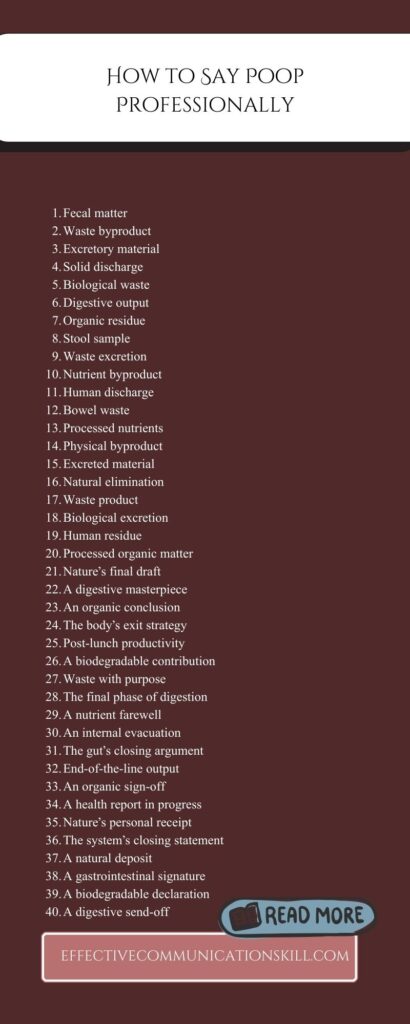Discussing bodily functions can be awkward, especially in professional settings. Yet, there are moments when such topics need to be addressed—whether in healthcare, childcare, environmental science, or even office humor gone astray. Knowing how to say poop professionally can save you from unnecessary embarrassment while maintaining decorum.
Professional communication often demands using terms that are both appropriate and respectful, particularly when the subject matter is less than glamorous. Instead of relying on colloquial or informal language, professionals often opt for clinical, technical, or neutral terminology to convey the message effectively.
This skill isn’t just about word choice—it’s about ensuring clarity while respecting the sensitivities of your audience. Whether you’re drafting an email, delivering a presentation, or simply engaging in casual office banter, mastering this language can make a difference. In this guide, we’ll explore polite and professional ways to refer to this delicate subject with confidence and ease.

10 Helpful Tips on How to Say Poop Professionally
Mastering polite and professional language can transform an awkward topic into a respectful conversation. These tips for saying poop professionally will help you address the subject with clarity and tact.
1. Use Clinical Terms
Opt for medical terminology like “feces” or “stool” when discussing the subject in healthcare or scientific contexts. For example, “The stool sample has been sent for analysis to identify potential issues.” Using clinical terms keeps the conversation precise and appropriate for professional settings.
2. Refer to Waste Material
In environmental or sanitation discussions, “waste material” is a practical and respectful term. For instance, “The facility handles waste material using sustainable methods.” This neutral phrasing ensures clarity without making anyone uncomfortable.
Here you like How to Professionally Say Sorry to Bother You (140 Formal Synonyms, Phrases and Sentences)
3. Say Digestive Byproducts
This term works well in educational or scientific discussions related to nutrition or health. For example, “Digestive byproducts provide valuable insights into the body’s metabolic processes.” It sounds professional and emphasizes the biological aspect.
4. Use the Term Excrement
“Excrement” is formal and fits well in contexts where a clinical or research-oriented tone is needed. For example, “The study focused on how excrement impacts environmental ecosystems.” It is ideal for maintaining professionalism in serious discussions.
5. Discuss Bowel Movements
“Bowel movements” is a widely accepted term, especially in medical or caregiving environments. For instance, “Regular bowel movements indicate a healthy digestive system.” This phrase communicates effectively while remaining respectful.
6. Call It Solid Waste
“Solid waste” is a neutral and commonly used term in environmental or operational contexts. For example, “The municipality’s program addresses the recycling of solid waste.” It provides a professional tone suitable for logistical discussions.
7. Say Human Waste
When discussing sanitation or public health, “human waste” conveys the message clearly and professionally. For instance, “The proper disposal of human waste is essential to preventing disease outbreaks.” This term is particularly useful in global health or infrastructure discussions.
8. Use Biological Waste
“Biological waste” offers a technical and formal option suitable for scientific or regulatory contexts. For example, “The facility has protocols for handling biological waste safely.” It emphasizes the procedural and safety aspects of the subject.
9. Mention Waste Products
“Waste products” is a general yet professional term that can fit various scenarios. For example, “The body eliminates waste products through several processes essential for health.” This phrasing is ideal for broad discussions involving digestion or bodily functions.
10. Use the Phrase Bodily Waste
“Bodily waste” maintains a neutral and professional tone, especially in health or education-related discussions. For instance, “Proper understanding of how the body processes bodily waste is critical for this research.” It keeps the focus on the topic without unnecessary informality.
Formal Synonyms to Say Poop
Finding the right words for sensitive topics is key in maintaining professionalism. These formal synonyms offer respectful alternatives for various contexts.
- Fecal matter
- Waste byproduct
- Excretory material
- Solid discharge
- Biological waste
- Digestive output
- Organic residue
- Stool sample
- Waste excretion
- Nutrient byproduct
- Human discharge
- Bowel waste
- Processed nutrients
- Physical byproduct
- Excreted material
- Natural elimination
- Waste product
- Biological excretion
- Human residue
- Processed organic matter
Here you like How to Professionally Say This is Unacceptable (200+ Formal Synonyms, Phrases and Sentences)
Formal Phrases to Say Poop
- Waste matter excreted by the digestive system.
- Material discharged from the gastrointestinal tract.
- Solid waste eliminated during bowel movements.
- Excreted matter processed by the digestive organs.
- Stool released as part of digestive function.
- Organic residue expelled during defecation process.
- Bodily waste discharged via the large intestine.
- Digestive byproduct eliminated from the human body.
- Excreta released following nutrient absorption in digestion.
- Fecal matter produced by the digestive process.
- Solid excretions resulting from food breakdown.
- Intestinal contents expelled as waste from digestion.
- Undigested remnants removed through bowel evacuation.
- Solidified waste matter produced during digestion.
- Digestive waste eliminated through the rectal passage.
- Human excreta processed and expelled during digestion.
- Byproduct of digestion discharged as solid waste.
- Bodily discharge resulting from food metabolism process.
- Solid waste excreted by the colon’s function.
- Residual matter expelled after gastrointestinal activity.
- Waste substances eliminated from the digestive system.
- Fecal residue evacuated during bowel movement processes.
- Solid material excreted during digestive waste expulsion.
- Natural waste matter expelled by intestinal movement.
- Digestive remains removed through rectal elimination.
- Organic waste expelled via the rectal passageway.
- Residual matter formed after gastrointestinal nutrient absorption.
- Digestive byproducts eliminated from the human colon.
- Intestinal waste evacuated during regular bowel movements.
- Solid organic waste produced through digestive metabolism.

Funny Yet Respectable Phrases to Say Poop
Humor doesn’t have to compromise respect or professionalism. These light-hearted yet formal phrases add a touch of levity to sensitive conversations.
Here you like How to Say You Have Plans Already Professionally (200 Formal Synonyms, Phrases and Sentences)
- Nature’s final draft
- A digestive masterpiece
- An organic conclusion
- The body’s exit strategy
- Post-lunch productivity
- A biodegradable contribution
- Waste with purpose
- The final phase of digestion
- A nutrient farewell
- An internal evacuation
- The gut’s closing argument
- End-of-the-line output
- An organic sign-off
- A health report in progress
- Nature’s personal receipt
- The system’s closing statement
- A natural deposit
- A gastrointestinal signature
- A biodegradable declaration
- A digestive send-off
100 Useful Sentences to Say Poop Professionally In Several Settings
When people search for professional phrases to say poop professionally, their intent is likely informational, aiming to find polite, formal, or context-appropriate terms or phrases for discussing this topic in professional or sensitive settings. These example sentences may range from medical to humorous contexts, depending on the scenario.
1. Medical Communication
- The doctor requested a stool sample for further analysis.
- Regular bowel movements are essential for good health.
- The fecal matter test results will be available tomorrow.
- Please report any changes in stool consistency to your physician.
- The patient exhibited signs of digestive issues based on stool patterns.
- Feces can provide valuable insights into gastrointestinal health.
- Consistent bowel irregularities should be evaluated by a healthcare professional.
- Excretory material analysis is part of routine diagnostic tests.
- The nurse noted that the patient’s stool appeared abnormal.
- Proper hydration supports regular digestive waste elimination.
2. Professional Discussions in Health and Sanitation
- Solid waste management is a priority for our facility.
- Human waste disposal methods must meet environmental standards.
- Bacteria in organic waste contribute to natural decomposition.
- Ensuring proper handling of fecal matter is critical in this project.
- Waste excretion systems require routine maintenance.
- The team is addressing solid waste concerns in urban areas.
- Proper sanitation reduces the risks associated with biological waste.
- Training covers protocols for handling excretory materials safely.
- The sanitation plan includes human waste disposal improvements.
- We focus on reducing the environmental impact of organic residue.
3. Childcare or Educational Contexts
- Parents are encouraged to track their child’s bowel movements for any irregularities.
- Please let us know if your child has difficulty with digestive waste.
- Children learn proper hygiene habits after solid waste elimination.
- Teachers monitor bathroom routines to ensure children are comfortable.
- The daycare staff discussed waste elimination habits with parents during the meeting.
- Early training focuses on recognizing when bowel movements occur.
- Organic residue consistency can sometimes indicate dietary needs.
- The facility promotes educational materials about healthy digestion.
- Our program addresses the importance of regular digestive processes.
- Any concerns about your child’s stool should be shared with a pediatrician.
4. Workplace Conversations
- The cafeteria waste includes organic residue that must be disposed of responsibly.
- Proper management of solid discharge is part of workplace hygiene.
- The office survey addressed sanitation improvements related to waste management.
- Digestive waste disposal facilities are regularly maintained.
- Discussions about human waste handling were part of the operations meeting.
- Staff are reminded to report any issues with waste elimination systems.
- Organic waste collection is scheduled weekly to avoid disruptions.
- Policies about fecal waste disposal are outlined in the handbook.
- Employees discussed eco-friendly solutions for handling workplace waste products.
- The team addressed biological waste in the new sustainability plan.
5. Writing Reports or Presentations
- This report focuses on biological waste management in urban areas.
- Analysis of fecal matter revealed contamination in the water supply.
- Regular bowel movement patterns are key indicators of public health.
- The presentation emphasized the importance of proper excretory material disposal.
- Waste byproducts play a role in environmental sustainability discussions.
- The data shows solid discharge trends over the past year.
- Excretory materials require effective management to minimize environmental risks.
- Human waste disposal processes are outlined in this section.
- The report examines the impact of stool disposal methods on public health.
- Digestive byproducts contribute to soil fertility when processed correctly.
6. Euphemisms for Humor in Formal Settings
- Nature’s final draft is an essential part of life.
- The digestive masterpiece completes the circle of life.
- Organic conclusions deserve professional handling.
- Every exit strategy has its purpose.
- A health-focused team respects the body’s final contribution.
- Digestive brilliance should never be ignored.
- Post-lunch productivity keeps the day moving forward.
- A biodegradable declaration deserves sustainable solutions.
- The gut’s closing argument never fails to make an impact.
- Respect for nature’s personal receipt is part of our commitment.
7. Customer Communication in Product Industries
- Our diapers are designed for effective waste management.
- Proper handling of digestive waste is crucial for baby care.
- The cleaning products ensure easy removal of solid discharge.
- Fecal residue can be effectively managed with our products.
- The eco-friendly bags are ideal for waste elimination.
- Biological waste containment is a top priority for our brand.
- Our product simplifies the process of dealing with waste byproducts.
- Digestive byproduct disposal is made easy with our range of solutions.
- Human waste cleanup is safe and hygienic with these tools.
- We provide eco-conscious options for managing organic residue.
8. Creative Writing or Script Development
- The protagonist stumbled upon nature’s own digestive output.
- The aliens were baffled by the human fascination with stool samples.
- A key plot point revolved around managing organic waste in space.
- The detective found clues hidden in the processed nutrients.
- A comedy scene depicted a misunderstood reference to excretory materials.
- The villain’s hideout was disguised as a solid waste facility.
- The character’s speech referenced the gut’s closing statement humorously.
- The narrative highlighted the importance of bowel waste in survival.
- A subplot involved eco-friendly disposal of fecal residue.
- The dialogue cleverly incorporated a reference to nutrient byproducts.
9. Navigating Cultural Sensitivities
- Different cultures approach biological waste disposal uniquely.
- Cross-cultural discussions focused on managing fecal residue responsibly.
- Human waste disposal standards vary globally.
- Collaborative projects respect local approaches to digestive waste management.
- International teams work together on waste product solutions.
- Cultural practices influence solid waste disposal methods.
- The team ensured proper terminology for bowel movements in translations.
- Respect for regional customs guided organic waste discussions.
- Multinational guidelines addressed excretory material handling respectfully.
- Training highlighted cultural nuances in digestive byproduct disposal.
10. Parent-Teacher Conferences
- We monitor bowel movement routines to ensure the child’s well-being.
- Please inform us of any concerns about your child’s digestive waste patterns.
- Teachers observe bathroom habits for developmental insights.
- Solid waste elimination is a natural part of learning hygiene.
- The school emphasizes respectful discussion of waste products with children.
- Discussions about fecal matter focus on fostering healthy habits.
- Parent resources address concerns about irregular stool patterns.
- Organic residue management is handled discreetly during school hours.
- Our staff prioritize privacy and respect when handling excretory needs.
- Regular updates are provided on children’s health, including waste elimination habits.

Conclusion
In professional or formal settings, discussing sensitive topics like digestion requires thoughtful and appropriate language. Mastering how to say poop professionally ensures clear communication while maintaining respect and decorum.
Whether you’re in healthcare, education, or any workplace scenario, choosing suitable terms can make potentially awkward conversations much smoother. By using the tips and phrases provided, you can confidently navigate these discussions without discomfort, showcasing professionalism and tact. Always remember: words matter, even for the simplest topics!
